- Home
- Lauren Oliver
The Fearsome Firebird Page 8
The Fearsome Firebird Read online
Page 8
“We can help you,” Max said. “We could scout for you.”
Rosie smirked at her. “Thanks for the offer, sweetheart,” she said. “But I’ve got it covered.”
Max felt her face blush a deep red and decided she didn’t like Rosie at all.
Rosie stood up, signaling that the meeting was over. “You can find your way out, can’t you? Watch out for the boxes—had a client in here the other week tripped and went headlong down the stairs. We’re suing the box manufacturer. Hazardous, if you ask me.” She plastered on her toothy grin again and began pumping Mr. Dumfrey’s hand, even as she led him toward the door.
“We haven’t—erm—discussed the issue of payment,” Mr. Dumfey said. “I’m afraid that at this very moment, the museum is in just a bit of a tight spot.”
Rosie waved a hand. “Consider it a favor. It’s the least I can do for an old friend, isn’t that right?” She clapped Mr. Dumfrey so hard on the back he stumbled. “Besides, this kind of case makes publicity you can’t buy for the world. No, no. This one’s on me. Don’t you think another word about payment.”
“Wonderful woman,” Mr. Dumfrey said, once they were back on the street, blinking in the sunshine.
“Harumph,” was all Max said.
When they returned to the museum, they found the street even noisier than usual. Two enormous moving vans, parked up the block, were obstructing the flow of traffic. Angry truckers, cabbies, and drivers were blowing their horns and shouting curses out the windows of their vehicles, while men in blue overalls unloaded box after box from the vans, ignoring the deafening din.
“Looks like someone’s taking over Cupid’s Dance Hall,” said Thomas.
“Maybe a decent restaurant,” Mr. Dumfrey said hopefully. “We could use one around here.”
Drawing closer to number 344, they noticed a woman standing at the entrance. She unfolded a piece of paper from her pocket, squinted at it, and then stared up at the museum’s double doors, as if to verify she had the right address.
“Can I help you?” Mr. Dumfrey said. She started and turned to them.
She was, Sam thought, one of the prettiest women he’d ever seen in his life. Some people, Sam knew, thought that Caroline and Quinn were beautiful, and he judged that this woman must be about their age. But whereas Caroline and Quinn had the soft, pale skin of uncooked dumplings—at least in Sam’s opinion—this woman had a complexion of fine ivory, with a strong nose and dark, cascading hair, heavy eyebrows, and a mouth that looked as if it had been stained with strawberry juice.
When Max grew up, Sam thought, she would look a little like that. Immediately, he pushed the idea of Max and her lips away, just in case Pippa decided to drop in unexpectedly on his thoughts, an irritating habit she’d recently been cultivating.
“I’m looking for Mr. Dumfrey,” she said, and smiled, showing off white teeth that were just a tiny bit uneven.
“And you’ve found him,” Mr. Dumfrey said cheerfully. Ever since Rosie had agreed to work for no pay, he’d been in a remarkably good mood. “To what do I owe the pleasure?”
“I saw an article about the museum in the newspaper,” the woman said. She was wearing a camel-colored coat that reached from her chin practically to her ankles. She tugged on the collar, and Sam wondered how she wasn’t burning up. “I was hoping you might have an open position.”
“And you are . . . ?” Mr. Dumfrey said.
“Emily,” she said, smiling again, “Emily Bellish.”
“Well, you see, Miss Bellish,” Mr. Dumfrey said apologetically. “Just now the museum is experiencing a few complications of the financial variety. That is to say, we’re in absolutely no position to . . .”
He trailed off as Emily’s whole face transformed. Her smile evaporated. She looked suddenly wide-eyed and helpless, like a child lost without parents in a crushing crowd. The effect was so terrible Sam would have rushed to her and given her a hug, had he not 1) been by nature painfully shy and 2) been likely to crush her ribs by doing so.
Mr. Dumfrey coughed, as if choking back the words he’d been about to say. “But there’s always room for more talent! Come, come.” Mr. Dumfrey gestured her up the steps toward the doors. “Let’s go up to my office. We’ll have more privacy there.” And they were gone, disappearing together into the museum.
Thomas shook his head. “She must have an act,” Thomas said. “I wonder what it is?”
“I don’t know,” Sam said musingly. “She doesn’t look like a freak, that’s for sure.” He was still struck by the woman’s dark eyes and low voice, and by the idea of Max smiling at him like the woman had, all warmth and twinkle. Then he became aware that the real Max was scowling.
“Did you see that coat?” she said. “Maybe she has scales.”
“Or maybe she’s a human owl, like your old boyfriend, Howie,” Sam blurted out, before he could regret it. He was expecting Max to yell at him—she had expressly forbidden any of the others from mentioning Howie’s name, on pain of having their tongues plucked out of their heads—but instead she merely narrowed her eyes at him and then turned, flouncing into the museum.
Pippa sighed. “Did you have to go and mention Howie?” she said. “Now she’ll be even nastier than usual.”
“Just ignore her,” Thomas said.
Pippa glared at him. “Easy for you to say. I share a corner with her. Last time she got in a bad mood about Howie, she used my favorite hat as target practice.”
“I don’t know why she’s so upset,” Sam grumbled. “It’s been almost two months.”
Pippa looked at him pityingly. “You really don’t understand anything, do you?” she said. Then she, too, followed Max into the museum.
Thomas shook his head. “Girls,” he said, in the tone of someone who knows all about it. “So what do you think? You going in?”
“Nah.” Sam stuffed his hands in his pockets—which weren’t, technically, pockets, since the lining had long ago given way to the pressure of his fingers. “Don’t feel like it yet.” In reality, he was already deeply regretting what he’d said to Max. In his most honest moments, Sam admitted to himself that he had a teensy, tiny crush on Max—but he was also terrified of her, and in no mood to be on the receiving end of one of her rages.
“Come with me,” Thomas said. “I’m going to run up and say hi to Mr. Sadowski. You remember how he has all those old newspapers?”
Sam nodded. In addition to old newspapers, Sadowski also had old radios, old coffee mugs, old grocery lists, old socks, old photographs, old piles of furniture . . . In fact, there was very little that Sadowski didn’t have crammed into his apartment.
“That’s where we have to look for Rattigan,” Thomas said firmly. “Years ago, his arrest was big news. What do you want to bet we find names of the people who tried to spring him?”
“Sure.” He was more than a little relieved to have an excuse to delay returning to the museum for a bit. And if the last time he’d accompanied Thomas up to Mr. Sadowski’s apartments was any indication, they might be busy for hours. Mr. Sadowski had quite a library. The problem was that he could never seem to find it.
As soon as they started down the street, however, Sam saw something that made him stop dead.
That something was a hat—a large, feathered hat, worn by a large, elaborately dressed woman standing in front of the moving trucks, giving orders to the men in suspenders. Her face was concealed by the enormous straw brim, and she was too far down the street for Sam to make out what she was saying, but he recognized her fat bejeweled hands and the sharp cadences of her voice, like an enraged canary.
He felt as if all the blood in his body had pooled into his feet. “Is that—?” he gasped out, but found he couldn’t say her name. “That can’t possibly be . . .”
Thomas had spotted her, too, and he let out a short, anguished cry. “Von Stikk,” he said. “What’s she doing here?”
But it was painfully obvious: both Sam and Thomas stood, stricken, as she hefted a woode
n crate in her arms and disappeared inside the old Cupid’s Dance Hall, followed by several movers, who’d obviously been ordered to work faster. Thomas started across the street immediately and Sam followed after him, feeling queasy, hoping there must be some mistake, some innocent explanation for the trucks and the cartons and Von Stikk’s presence on West Forty-Third Street.
There was, however, no mistake. Many of the cartons were labeled with Von Stikk’s name. And the old tin sign that used to hang next to the doors of the dance hall, the one that listed various rules, such as no cursing, spitting, or gambling, had been replaced by a sign that said simply, in elegant cursive: Von Stikk School for Extraordinary Underprivileged Youths. It seemed she had combined her two latest educational projects.
Andrea von Stikk was moving in.
Eli Sadowski’s apartment might have doubled as a museum for all the broken, useless, and bizarre objects, including old costume mannequins and sawhorses, sewing machines and picture frames, cracked mirrors and grandfather clocks missing their hands—much of it stacked in enormous towers that seemed a bare nudge from toppling over. As usual, Eli greeted them with the offer of milk tea, which they quickly and emphatically declined.
“Well, nice to see you, always very nice to see you,” he said, but he seemed even more agitated than usual and Sam noticed he had not taken the time to finish dressing. Normally he wore a suit that might have been lifted from the last century, complete with a top hat and even a cravat. “My brother Aaron sends his regards, as usual.”
Thomas and Sam avoided looking at each other. Aaron Sadowski had been dead for several weeks, but Eli insisted on consulting him about matters, such as what to serve for tea and whether it was a good time to begin tidying the apartment (the answer was always no).
“You’ll forgive me,” Eli said, with an aggressive sweep of his hand that threatened to topple an enormous stack of empty milk bottles, “but I have business outside. A terrible thing, really—I would avoid it absolutely if I could—but very urgent. I’ve just read that an abandoned rocking chair has been sitting for days on Seventy-Second Street. So you see there’s not a moment to lose.”
Sam couldn’t help but note that Sadowski already had several broken rocking chairs wedged beneath broken card tables and armchairs whose stuffing was largely missing. “Do you need another rocking chair?” he couldn’t help but ask.
Eli didn’t seem to hear. “Shameful, what people waste,” he said, putting one foot into a dress shoe and another into a galosh without seeming to notice the difference. “Shameful,” he repeated, grabbing what looked like a constable’s hat and wedging it down over his head. “In any case, stay as long as you like. You know the way out.” And without another word, he hurtled into the hall, slamming the door shut so that all the towers of objects in the apartment gave a faint, ominous shudder. Dust filtered down from the ceiling, and Sam sneezed.
“Well,” Thomas said with fake cheer. “Let’s get started.”
For hours, they worked their way through stacks of mildewing and yellowed newspapers, looking for news stories about Rattigan and clues about the identities of the people who’d helped him after he made his first, infamous break from prison. But it was no use. The newspapers weren’t organized by year—they weren’t organized at all—and although they found plenty about Rattigan, it was nothing they didn’t already know.
Finally, Thomas stood up. “This is pointless,” he said.
Sam agreed only too happily. His knees ached from sitting cross-legged, and his back was sore from bending over decades-old print. Besides, it had started to get dark, and Sadowski’s twisted towers of belongings cast heavy shadows over the floor and reminded Sam of warped fingers, reaching for something.
They retraced their path to the door only to find themselves in an unfamiliar room filled almost entirely with birdcages.
“Hmmm.” Thomas frowned. “Maybe we should have made a left at the plaster bust of Beethoven?”
They tried again to find the door, only to end up in yet another unfamiliar portion of the vast apartment: a bathroom, the entire tub filled with bottle caps.
“I told you,” Sam said, getting frustrated, “to go straight at the stack of old gramophones.”
This time, he took the lead. But barreling around the corner, eager to get out of Sadowski’s apartment as soon as possible, he let out a shout: a terrible face was staring back at him, an insect’s face with a long, deformed snout, its enormous eyes reflecting his look of terror.
Thomas stepped around him, reached up, and unhooked the thing from the coatrack where it had been hanging. When he swung it in Sam’s direction, Sam took a step backward.
“What is that thing?” Sam asked. Even though he saw now that it was not, in fact, a gigantic insect, it was as terrifying as ever to him.
“Gas mask,” Thomas said quietly. “From the war. They killed thousands of people with gas.” He began to move as though to hook the gas mask over his head.
“Don’t.” Sam reached out a hand to stop him, and Thomas dropped the mask before he could. “Don’t.” In the quiet sifting of the dust and the darkness settling all around them, it was all too easy to imagine the ghosts of old soldiers passing nearby.
Thomas replaced the mask carefully. Two more right turns, and they saw the door at last. They hurried home in silence, to the warmth and noise and safety of the museum.
As soon as they revealed that Miss von Stikk’s School for Extraordinary Underprivileged Youths had relocated to just down the block, Max let out a screech so loud it stunned the other three into silence.
The Firebird, which had been relocated to the attic to help it “integrate” with the other performers—Mr. Dumfrey was hoping that his investment might at last be persuaded to learn words that weren’t insulting—came awake with a squawk. Even Freckles, who had been hungrily eyeing the bird from a distance, darted under Sam’s bed.
“WHAT?” Max sprang to her feet and began rummaging through the collection of objects piled around the attic. She opened old steamer trunks and closed them again, cursing. She shoved aside a set of leather-bound books and even overturned a wastepaper basket, which thankfully contained only a single crumpled tissue and a coffee-soaked playing card.
“What on earth are you looking for?” Pippa asked.
“Matches,” Max responded, without looking up, as if it was the most reasonable answer in the world. She was on her hands and knees now, feeling beneath the sagging sofa cushions.
“Why? So you can burn the place down?” Sam said it as a joke—but when Max glared at him, he knew she was dead serious.
“Don’t be stupid,” Pippa said. “It’s brick. A fire would never catch.”
Max sat back on her heels, seeming to accept the reasonableness of this line of logic. But her face stayed dark and her eyes were flashing like railway signals. Danger, danger. “It’s all that woman’s fault,” she practically spat. “Rosie Bickers.”
Pippa sighed. “You’re just mad that Rosie called you sweetheart.”
Max whirled on her, and Sam was grateful that, for once, somebody else had been the one to say the exact wrong thing. “I’m mad,” she said, her voice getting dangerously quiet, “that Rosie was the one to set up Von Stikk in our backyard, and then forgot to tell us about it.” She shook her head disgustedly. “What do you want to bet that fat hyena will be banging down our doors morning, noon, and night? What do you want to bet she’ll be making up stories about us in the papers?”
“Max is right,” Pippa said, gnawing on her lower lip. “She’ll never leave us in peace.”
“We’ll never be in peace, period.” Now Max’s voice was rising again, climbing up a scale of rage. “If it’s not Von Stikk coming after us, or the papers calling us monsters, it’s the police accusing one of us of trying to bump off a stranger and locking up poor General Farnum, when really they should be trying to keep Rattigan from bumping us off.”
She lingered on the last note, and Sam had a sharp, painful
memory of Rattigan’s voice, like the whisper of a silk cord around the throat.
In the end, you see, your father was weak . . . far too weak to stop me . . .
He forced aside the memory, but couldn’t so easily get rid of the cold feeling that had overtaken him.
Max was right. Even if they miraculously tracked down Rattigan, there would never be a stop to the accusations, the attention, the constant needling feeling of being looked at and judged. They were growing stronger, smarter, more skillful by the day.
But that only meant they were getting further and further from normal.
Everyone settled into a gloomy silence. Thomas sat, frowning deeply, staring glumly at his shoes.
But after a while, he straightened up. “You know, Max,” Thomas said slowly. “You’re not totally right. There is something we can do.”
“Do-do!” the Firebird squawked. “That’s about all you’ll do-do!”
Everyone ignored the bird.
Pippa looked at Thomas. “About Rattigan?”
“I wasn’t thinking of Rattigan,” Thomas said.
“About Von Stikk?” Despite her turbulent expression, a note of hopefulness crept into Max’s voice.
“No, not about her, either.” Thomas scrubbed the side of his nose. “I meant that we can help General Farnum.”
Sam stared at him. “But the police—”
Pippa immediately made a noise of protest, as if Sam had cursed.
“The police always go for the most obvious solution,” Thomas said, shaking his head. “Farnum didn’t kill Ernie Erskine. We’re agreed on that, right?”
Everyone nodded.
“But he did go see Erskine,” Thomas continued. “Which means that the murderer must have seen Erskine after him. Maybe he left some evidence behind.”
“Like what?” Max scoffed. “A bloody handprint?”
“Not likely!” the Firebird squawked, ruffling its feathers and giving a convincing impression of laughter. “Not bloody likely!”

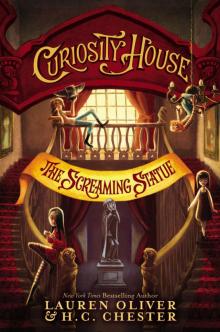 The Screaming Statue
The Screaming Statue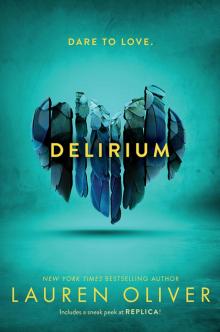 Delirium
Delirium Before I Fall
Before I Fall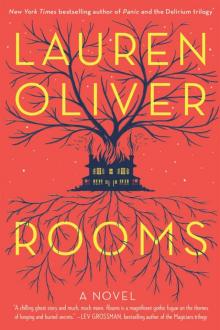 Rooms
Rooms Replica
Replica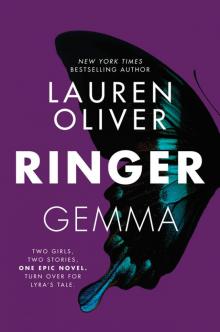 Ringer
Ringer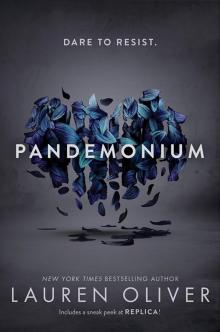 Pandemonium
Pandemonium The Shrunken Head
The Shrunken Head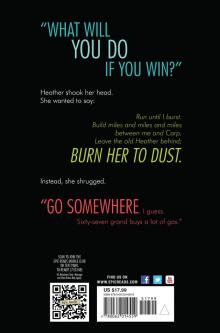 Panic
Panic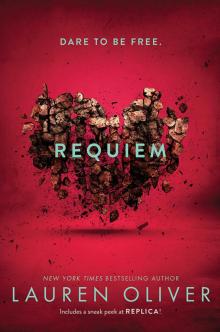 Requiem
Requiem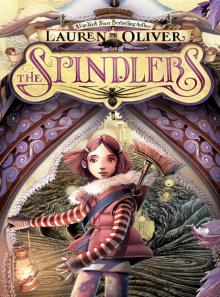 The Spindlers
The Spindlers Annabel
Annabel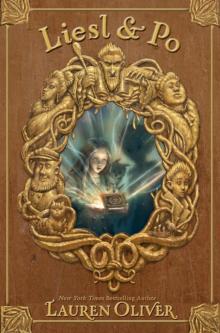 Liesl & Po
Liesl & Po Raven
Raven Alex
Alex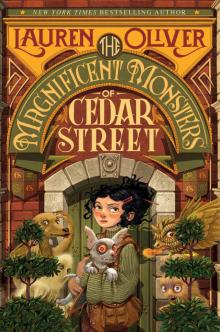 The Magnificent Monsters of Cedar Street
The Magnificent Monsters of Cedar Street Vanishing Girls
Vanishing Girls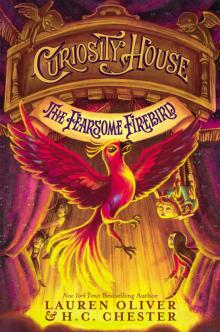 The Fearsome Firebird
The Fearsome Firebird Raven: A Delirium Short Story
Raven: A Delirium Short Story Annabel: A Delirium Short Story
Annabel: A Delirium Short Story Hana: A Delirium Short Story
Hana: A Delirium Short Story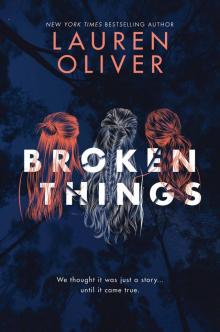 Broken Things
Broken Things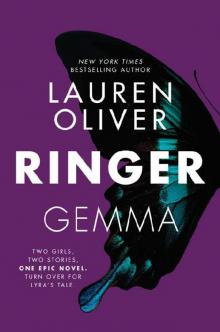 Ringer (Replica)
Ringer (Replica) Alex (delirium)
Alex (delirium)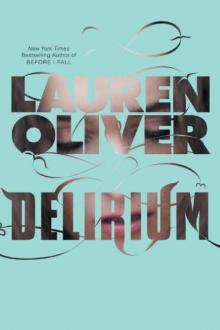 Delirium dt-1
Delirium dt-1